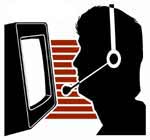The Employee Free Choice Act (H.R. 1409, S. 560) is pending legislation in the United States. Its text states that it would "amend the National Labor Relations Act to establish an easier system to enable employees to form, join, or assist labor organizations, to provide for mandatory injunctions for unfair labor practices during organizing efforts, and for other purposes." It contains provisions that people should be aware of. Especially people involved in small businesses. The provision getting the most attention is Card Check. No matter what your politics, the secret ballot should be held sacrosanct in the US. The secret ballot lets people vote how they want without fear of intimidation or retribution. It's the American way. As Steve Forbes says in this podcast, removing secret ballots is "more of a Soviet style way of doing a union election."
COSE, the Council of Smaller Enterprises says, "The biggest threat to small business this year is Card Check." COSE has detailed information about the proposal and its effect on small businesses on their website. It seems hypocritical that some of the supporters of this current US act have written letters to the Mexican congress urging them to use secret ballots while sponsoring a bill that replaces secret ballots in our own country. Even former Senator George McGovern, a noted friend of big labor, has come out of retirement to speak against the card check proposal. McGovern has released political advertisements in opposition to the bill, saying "It's hard to believe that any politician would agree to a law denying millions of employees the right to a private vote. ... Quite simply, this proposed law cannot be justified."
The other major problem with this bill is the binding arbitration clause. COSE asks, " What is the Impact on Employers and Employees?
Card-Check can have a detrimental impact on both employers and employees. If passed, employers would be subject to mandatory arbitration, contract limits and undue fines for communicating with employees during the process of unionization or contract negotiation. Employees would be adversely impacted not only because they would lose their right to vote, but also because they would lose the personal relationship with their employer. In addition, employees would be subject to a one-size-fits-all approach to their wages, benefits, etc. and would not have the ability to negotiate the terms of their contract (lasting for 2 years) once it is determined by an arbitration panel. "
Small business owners constantly make changes and adapt - they have to. They are independent thinkers who move and react quickly to compete with larger companies and in a global economy. How many can survive two years of government mandated orders dictating the wages, salaries, benefits, vacations, etc in their workplace? Two years can be an eternity to a small business. In this snippet from a conference call, Steve Forbes focuses on the two most glaring problems with the Employee Free Choice Act which he calls the Employee Forced Choice Act: the removal of the secret ballot and the binding arbitration clause.
April 7, 2009
2,810 KB
2:59
 Listen to Steve Forbes Listen to Steve Forbes
Watch a video from the Workforce Fairness Institute
Top of Page | 